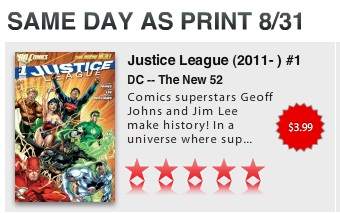DC’s senior VP of Digital apparently cares more about on-ground retailers than readers.
The DC Comics relaunch, known as the New 52 has begun, and with it some new policies for their digital distribution model. Starting with JLA #1 on Wednesday, all comics go on sale in the digital store the same day they go on sale in the on-ground stores. With this change however, the prices for digital comics have been raised to match the print editions: $4 for a main-line (Superman, Batman, JLA, etc.) issue, and $3 for all others.

The reason for this is pretty clear, and has been since the start. DC doesn’t want to offend the on-ground retailers by drawing people away from the stores toward the digital editions on release day.
So I was happy to see IGN publish an interview with the guy in charge of DC’s digital distribution, Hank Kanalz, hoping that IGN would use its clout to ask some hardball questions about this terrible policy. I was disappointed.
Still, they did ask about it. Yes, in a softball way, they lobbed the topic over the plate, making a good opening, but not really driving the point home.
“Our goal is to provide choice, not lead readers to one format or the other based on price,” Kanalz said in response to the question. “Equal pricing leaves the choice up to our fans to pick the format they prefer. After one month our digital comics do go down by $1 making it easy for readers to reread or catch up with favorite issues digitally.”
This, of course, is the answer we would expect. It’s the spin we already know. They are concerned for the poor little comic book stores and their poor little bottom lines. This is a ridiculous answer, and doesn’t really make any sense. People who like to buy the print version aren’t going to be lured away by the siren song of the cheaper digital editions, and if they are, they very well should be.
Print is dying, and pushing up prices of the digital version just to help sustain the print lines is irresponsible. DC might be afraid of the bad publicity of being blamed if the switch to digital comics kills a bunch of comic book stores, and that’s a valid concern for their PR people, but when comic book stores fail, it wont be DC’s fault, it will be that the world has moved on.
In addition, digital copies are actually a less valuable product. The reading may be the same, but printed comics are a commodity. The owner can resell a printed comic for 50-75% of its value the day after release if they want, or they could put it in a plastic sleeve in their attic for 10-50 years and resell it for 200-2000% of the cover price depending on the comic. Digital copies are worth absolutely nothing the instant they are downloaded. They can be collected, sure, but that collection will never be worth anything.
Finally, the overhead on digital distribution is much cheaper than print, so their profit margins are significantly higher per copy sold, making the equal price an ethics issue as well. The rest of the publishing industry gets this. Look at Amazon, for example. Most hardback books cost $10-20, paperbacks $6-13, and digital books $1-10. The digital copy is never the same price as the hard copy; it would simply not be fair to the consumer.
So, what Kanalz is really saying is that DC cares more about artificially inflating on-ground sales than it does about being fair to their readers who prefer digital copies. If they want to “[leave] the choice up to our fans to pick the format they prefer,” then they have done a poor job, because the current pricing structure pushes the consumer toward the print version. Anyone who doesn’t care which format they get, will absolutely choose the print version over the digital right now. The only people with digital copies on release day will be those who vastly prefer the digital.
Fair would be $2 for digital main lines and $1 for others. More than that is unfair to the readers.
I was hoping that IGN would follow that up with a more poignant question, like “Isn’t that a big ‘screw you!’ to all of your digital readers?” or perhaps, “Why does DC think it is their responsibility to continue to artificially bolster a dying business model, like on-ground comics stores?”
However, they did not. Rather IGN let the baloney answer go unchallenged and just moved on.






